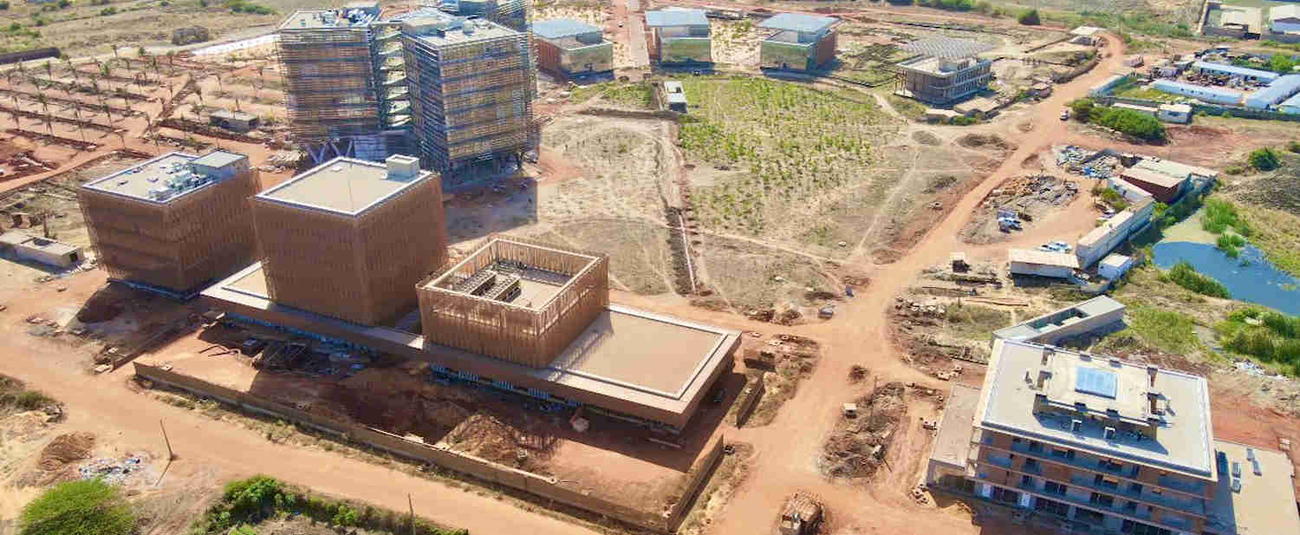The Board of Directors of AfDB group is providing additional financing of €5.01 million for the future Digital Technology Park in Diamniadio, Senegal.
The Group approved the funds this December while reaffirming its commitment to the project, which was initiated in 2016. The bank provided an initial loan of €60.96 million to finance the project in 2016.
Although the project is now about 80% complete, the COVID-19 crisis has caused a setback in some construction work due to worldwide inflation on materials costs and supply chain disruptions.
The Senegalese government will provide the equivalent of €9.64 million for this new loan, which would cover 87% of the project’s total cost of €73.62 million. The Senegalese Ministry of Economy, Planning, and Cooperation is in charge of the help through its Directorate of Economic and Financial Cooperation.
The 25-hectare future park is being built in the Diamniadio urban hub, which is still under development and roughly 35 km from Dakar, the country’s capital. Around 20 businesses have expressed interest in putting some of their operations in the planned park, including multinationals like ATOS, Free (formerly Tigo Senegal), and Solution Informatique Durable (SOLID). They require a reliable communications network to function, though.
Read also: AfDB Approves $301m Funding To Refurbish Uganda’s MGR Rail Line
How The Project Will Operate
Through an international tender, this loan will assist in providing the planned data center within the country with a cutting-edge storage and processing architecture.
“This project will help diversify and modernize Senegal’s economy and private sector,” said Marie-Laure Akin-Olugbade, African Development Bank Director General for West Africa. This park will transform Senegal into a regional digital hub, thus providing digital solutions to already existing industries, such as the agricultural sector. The goal is to increase the ICT sector’s share of economic activity from 7% to 10% by 2026.
In addition to the data center, components of the groundbreaking project cut across business process outsourcing facilities, an ICT incubator, a research center, a training center, and an audio-visual production and content development center. The project also provides institutional support, builds capacity, and sets up a management team that is in charge of putting it into action.
“The ICT sector is one of the most advanced in West Africa, and the project will benefit an entire ecosystem,” said Cherfi Mohammed, the Bank’s country manager in Senegal.
Mohammed says that “software” includes communication service operators, Internet service providers, multi-national companies, and about 30,000 men and women who work in fields related to information and communications technology (ICT), such as sales, networking, system design, software and content development, and so on. “The innovative solutions that will be developed in the park will also benefit government entities, which will be able to improve the delivery of public services.”
The Future Park is at the heart of the “Digital Senegal 2025” strategy, with an objective to create some 35,000 direct jobs from activities such as call centers, software and hardware engineers, and application development engineers. It also plans to create around 105,000 indirect jobs in housing, telecommunications, real estate rental, transportation, catering, and other support services.
AfDB and Japan Partner to Support Africa’s Private Sector with $5 Billion
How AfDB Is Supporting African Countries
In recent months, the African Development Bank has raised funds in the form of loans and grants to support innovative initiatives across African nations.
In Rwanda, the African Development Bank Group inaugurated the African Pharmaceutical Technology Foundation (APTF) at the Bank’s 2nd International Conference on Public Health in Africa, with the theme: “Technology Access for Pharmaceutical Manufacturing: The African Pharmaceutical Technology Foundation.”
The APTF is an innovative organisation that will considerably boost Africa’s access to technology that aids the production of pharmaceutical items.
In Uganda, the AfDB provided $301m for the refurbishing of the Kampala-Malaba Meter Gauge Railway (MGR ). The revamp is aimed at improving regional trade and reducing transportation costs.
The fund jointly includes loans and grants from AfDB, alongside its concessional lending window, the African Development Fund.
The rehabilitation project covers the 265km of MGR tracks between Malaba and Mukono, which includes the line to Jinja Pier and Port Bell on Lake Victoria.




